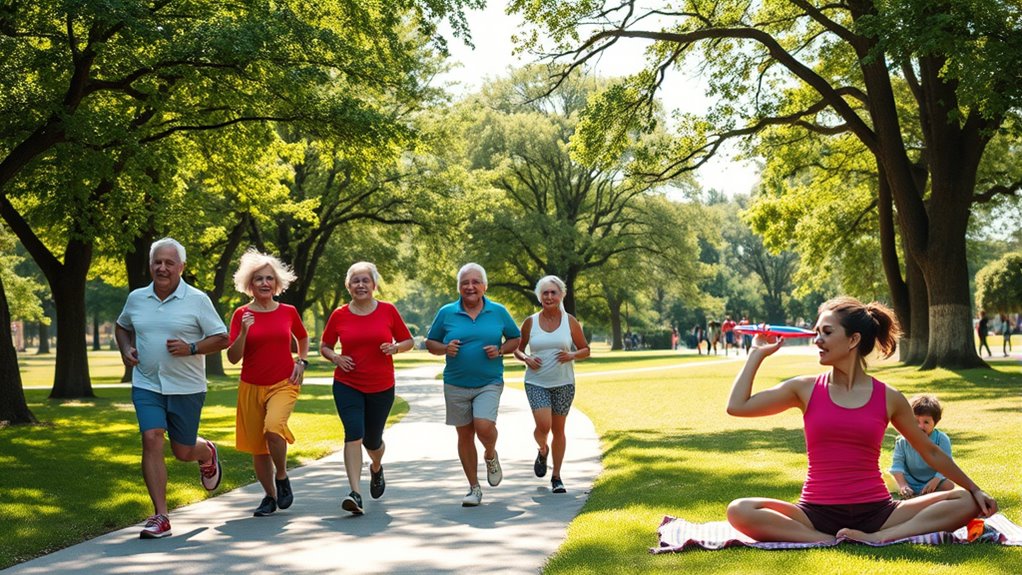Engaging in regular physical activity boosts your brain health by increasing blood flow, supporting neurogenesis, and releasing mood-enhancing chemicals like BDNF. Activities like walking, cycling, or strength training strengthen neural connections and improve cognitive functions such as memory, problem-solving, and emotional regulation. Incorporating diverse exercises and maintaining a routine enhances your brain’s flexibility and resilience over time. Keep exploring to discover how you can optimize your brain with simple, effective strategies.
Key Takeaways
- Regular aerobic exercises increase blood flow, promoting neurogenesis and the release of brain-derived neurotrophic factor (BDNF).
- Engaging in diverse activities like strength training and yoga enhances neural connectivity and cognitive flexibility.
- Consistent physical routines strengthen neural pathways, supporting long-term brain health and resilience.
- Physical activity stimulates growth of new neural connections, improving learning, memory, and emotional regulation.
- Combining physical and mental challenges optimizes neuroplasticity and mental agility for overall brain wellness.

Taking steps to boost your brain health can considerably improve your memory, focus, and overall mental well-being. One of the most effective ways to do this is through regular physical activity, which directly influences neuroplasticity enhancement and builds cognitive resilience strategies. When you engage in movement, your brain receives more oxygen and nutrients, stimulating the growth of new neural connections. This process helps your brain adapt to new challenges and recover more effectively from injury or mental fatigue. By consistently challenging your body with physical exercise, you reinforce your brain’s ability to rewire itself, making it more resilient over time.
Aerobic activities like walking, running, or cycling are particularly beneficial because they increase blood flow to the brain, fostering neurogenesis—the creation of new neurons. As you stay active, you promote the release of brain-derived neurotrophic factor (BDNF), a protein essential for supporting neuronal growth and synaptic plasticity. This boosts your brain’s capacity to learn new skills, remember information, and adapt to changing circumstances. Incorporating these activities into your routine isn’t just about physical health; it’s about strengthening your mind’s flexibility and robustness through neuroplasticity enhancement. Additionally, engaging in physical activity can help improve your mood and reduce stress, which further supports cognitive resilience.
Moreover, physical activity isn’t limited to cardio. Strength training, yoga, and even dance help develop cognitive resilience strategies by engaging different parts of your brain. These activities can improve executive functions such as planning, problem-solving, and multitasking. When you learn complex movements or routines, you challenge your brain to coordinate multiple systems, which enhances neural connectivity and promotes mental agility. As you progress in these activities, you reinforce pathways associated with attention, memory, and emotional regulation, making your mind more resilient to stress and age-related decline. Additionally, understanding how different forms of exercise influence brain plasticity can help tailor your routines for maximum cognitive benefit.
Engaging in diverse forms of exercise can also help optimize projector technology and other cognitive functions, illustrating how physical and mental stimulation work together to enhance resilience.
Consistency is key when it comes to reaping these benefits. Setting a regular schedule for physical activity helps your brain form stronger connections, making neuroplasticity enhancement a continuous process. Over time, this not only improves your cognitive abilities but also fosters a sense of achievement and motivation. Remember, even moderate activity like brisk walking for 30 minutes a day can have profound effects on your brain health. The more you move, the more you reinforce your brain’s capacity to adapt and recover, ensuring your mental resilience grows alongside your physical fitness. Embracing an active lifestyle is one of the most accessible and impactful steps you can take to keep your brain sharp and resilient for years to come.
Frequently Asked Questions
Can Specific Exercises Target Memory Improvement?
You might wonder if specific exercises can target memory improvement. While all physical activity benefits your brain, exercise specificity matters. Aerobic exercises like running or cycling boost blood flow, supporting memory enhancement. Strength training also plays a role by releasing growth factors that aid brain function. Incorporate a mix of cardio and resistance training to optimize memory. Consistency is key, so find activities you enjoy for lasting benefits.
How Does Exercise Influence Brain Plasticity?
Imagine your brain as a bustling city, constantly expanding and improving. Exercise acts like a construction crew, stimulating neurogenesis and strengthening synapses. It’s shown that regular activity boosts neurogenesis stimulation, creating new neural pathways, and enhances synaptic connections, making communication smoother. This ongoing process increases brain plasticity, helping you adapt better to new challenges, learn faster, and recover from injuries more effectively. Your active lifestyle truly shapes your brain’s future.
Is There an Optimal Time of Day for Brain-Boosting Workouts?
You might wonder if there’s an ideal time for brain-boosting workouts. Your circadian rhythms influence your energy and alertness levels throughout the day, so workout timing can impact your mental performance. Many find morning exercise helps boost focus, while afternoon or evening sessions can enhance memory and learning. Pay attention to your body’s natural cycles and choose a time that aligns with your energy peaks for best brain benefits.
Do Indoor and Outdoor Activities Differ in Cognitive Benefits?
Indoor and outdoor activities both boost cognition, but they offer different benefits. Indoor challenges like puzzles or gym workouts improve focus and problem-solving skills, while outdoor exploration enhances mood and creativity through fresh air and natural scenery. You might find that mixing both types helps your brain stay sharp. So, incorporate indoor challenges for mental focus and outdoor activities for overall mental well-being to maximize cognitive benefits.
How Long Before Benefits Are Noticeable in Brain Health?
Did you know that some studies show cognitive benefits from exercise can appear in as little as two weeks? The neurogenesis timeline varies with exercise intensity; moderate activity promotes quicker brain cell growth, often noticeable within a few weeks. If you’re consistent, you might start feeling sharper and more focused in just 3-4 weeks. So, stick with your routine—your brain’s health improves faster than you think!
Conclusion
By staying active, you markedly boost your brain health. Just 150 minutes of moderate exercise weekly can reduce the risk of cognitive decline by nearly 30%. So, lace up your sneakers and keep moving—your brain will thank you. Regular physical activity not only improves memory and concentration but also helps protect your mind against aging. Make exercise a priority today, and enjoy a sharper, healthier brain for years to come.









